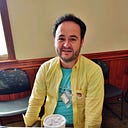Member-only story
Sam Peckinpah’s ‘Ride the High Country’ according to dirty rat James Drury

Cowboy James Drury, a mainstay of 1960s television as the titular hero of NBC’s The Virginian, participated in another legendary project — albeit as the villain in the 1962 western Ride the High Country. A previously unexcavated interview finds Drury reminiscing on nonconformist director Sam Peckinpah, charming scene stealer Warren Oates, the principled Joel McCrea, and avoiding Sunday punches.
The James Drury Interview, Part Three
What is your most critically acclaimed film?
I was freelancing and got the major role of Billy Hammond in MGM’s Ride the High Country [1962], directed by Sam Peckinpah and starring Randolph Scott and Joel McCrea. It became a classic western that has always remained in circulation. People think the world of it. Right after that I started The Virginian and got to be the hero [television’s debut 90-minute western was transmitted for an awe-inspiring 249 episodes between 1962 and 1971]. I had no time for any other projects until the late ’60s when I did an occasional movie for television and several theatrical releases, but nothing ever of the caliber of Ride the High Country. I played a dirty rat who shot McCrea at the climax, and he shot me.
McCrea has one of the most poignant death scenes captured on celluloid.
It was great. The whole movie was magical. We had such a wonderful cast — in addition to Mariette Hartley — John Anderson, John Davis Chandler, Warren Oates, and L.Q. Jones were my brothers [the Hammonds]. That’s a cast that draws your attention. They were all fantastic actors.
Was Peckinpah an unpredictable maverick in real life? How was he towards you?
We had no problems whatsoever. Sam was interested in making very important pictures. Years after our collaboration, he got into the sauce and drank a lot of vodka during the day. He would get real mean to people and cause a lot of trouble.
Sam was just a wonderful, practical, and inspired director. I’d known Sam since 1958 when I appeared in one of the first scripts he wrote and directed for television — a Rifleman episode [In season one “ The Marshal” introduced Paul Fix to the regular cast alongside Chuck Connors…
